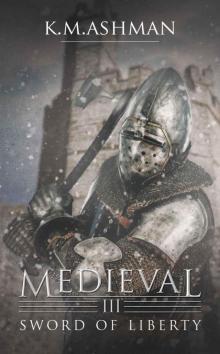Medieval III - Sword of Liberty


Author: Kevin Ashman
Category: Other
Published: 2014
Series:
View: 235
Read Online(The Medieval Sagas Book 3)In 1274, Edward the First ruled England having inherited the crown from
his father, Henry the Third. Across the border to the west, the smaller
country of Wales was ruled by Prince Llewellyn ap Gruffydd, a direct
descendant of Llewellyn the Great. Tensions were strained
between the two countries and minor conflicts were commonplace between
the lesser nobles but when Edward found out about Llewellyn's proposed
marriage to Eleanor du Montfort, the daughter of his deceased father's
greatest enemy, he was incensed and in 1275 arranged for her ship to be
intercepted as she traveled from France to be with the Welsh Prince.
Eleanor was imprisoned causing the relationship between Edward and
Llewellyn to deteriorate even further and in 1276, war broke out between
the two countries. In 1277, Edward led a huge army into Wales
and captured the Welsh harvest on the island of Ynys Mon, forcing the
Welsh Prince to surrender before any major battle was fought. Later that
year, the two men signed the treaty of Aberconwy where Llewellyn
surrendered control of most of the country in return for keeping the
lands of Gwynedd and the title, Prince of Wales. Edward was satisfied
and released Eleanor from prison to fulfill her marriage vows to
Llewellyn and for the next few years, an uneasy peace existed between
the two monarchs. Despite the treaty, the people of Wales were
still unhappy being ruled by an English monarch and especially the
construction of English castles at Flint, Rhuddlan, Builth Wells and
Aberystwth. Subsequently an undercurrent of resistance steadily grew
until finally in 1282, a full scale rebellion against Edward's rule
forced the English King to invade Wales once more, only this time with
full scale conquest as a goal. Despite some initial setbacks,
Edward's army was ultimately victorious and after several battles
throughout Wales, Prince Llewellyn was killed at the battle of Orewen
Bridge.Edward finally realised the threat the Welsh posed and embarked
on an unprecedented building programme across the country, including the
enormous castles at Caernarfon, Conway and Harlech, not just as
bastions of military strength but also as a signal to the Welsh about
the futility of opposing his might. These castles formed the
backbone of his defences in Wales, an unassailable system of fortresses,
each designed to mutually support each other against any threat from
the Welsh. They were a symbol of his might, a system of
invincible fortifications and in effect an impregnable ring of steel
unassailable by any living man......... ........or so he thought.......!
his father, Henry the Third. Across the border to the west, the smaller
country of Wales was ruled by Prince Llewellyn ap Gruffydd, a direct
descendant of Llewellyn the Great. Tensions were strained
between the two countries and minor conflicts were commonplace between
the lesser nobles but when Edward found out about Llewellyn's proposed
marriage to Eleanor du Montfort, the daughter of his deceased father's
greatest enemy, he was incensed and in 1275 arranged for her ship to be
intercepted as she traveled from France to be with the Welsh Prince.
Eleanor was imprisoned causing the relationship between Edward and
Llewellyn to deteriorate even further and in 1276, war broke out between
the two countries. In 1277, Edward led a huge army into Wales
and captured the Welsh harvest on the island of Ynys Mon, forcing the
Welsh Prince to surrender before any major battle was fought. Later that
year, the two men signed the treaty of Aberconwy where Llewellyn
surrendered control of most of the country in return for keeping the
lands of Gwynedd and the title, Prince of Wales. Edward was satisfied
and released Eleanor from prison to fulfill her marriage vows to
Llewellyn and for the next few years, an uneasy peace existed between
the two monarchs. Despite the treaty, the people of Wales were
still unhappy being ruled by an English monarch and especially the
construction of English castles at Flint, Rhuddlan, Builth Wells and
Aberystwth. Subsequently an undercurrent of resistance steadily grew
until finally in 1282, a full scale rebellion against Edward's rule
forced the English King to invade Wales once more, only this time with
full scale conquest as a goal. Despite some initial setbacks,
Edward's army was ultimately victorious and after several battles
throughout Wales, Prince Llewellyn was killed at the battle of Orewen
Bridge.Edward finally realised the threat the Welsh posed and embarked
on an unprecedented building programme across the country, including the
enormous castles at Caernarfon, Conway and Harlech, not just as
bastions of military strength but also as a signal to the Welsh about
the futility of opposing his might. These castles formed the
backbone of his defences in Wales, an unassailable system of fortresses,
each designed to mutually support each other against any threat from
the Welsh. They were a symbol of his might, a system of
invincible fortifications and in effect an impregnable ring of steel
unassailable by any living man......... ........or so he thought.......!
 Invitation To Evil: A Max MacAulay Novel
Invitation To Evil: A Max MacAulay Novel Right Fit Wrong Shoe
Right Fit Wrong Shoe Redemption
Redemption The Call of the Canyon
The Call of the Canyon Death Takes a Lover
Death Takes a Lover Survive
Survive Mated Girl (Wolf Girl Series Book 4)
Mated Girl (Wolf Girl Series Book 4) From the Mist
From the Mist